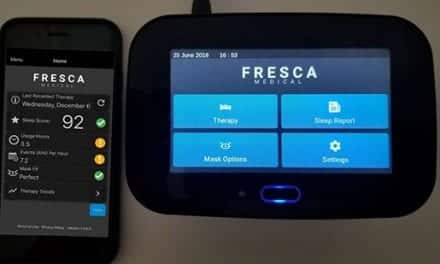Itamar Medical Ltd has funded a trial evaluating the use of CPAP to manage patients with confirmed or suspected COVID-19.
The study is a prospective, single-center, parallel group, open-label, randomized clinical trial to assess the efficacy of CPAP in 200 COVID-19 confirmed or suspected patients within the Mount Sinai Health System with respiratory symptoms who do not require hospital admission and are discharged home from the emergency room. The primary aim of the study is to determine if early, low, fixed CPAP at home reduces the risk of hospital/ER re-admission or death in COVID-19 confirmed or suspected patients.
Secondary aims of the study are to determine if obstructive sleep apnea (OSA) and obesity are independently associated with increased hospitalizations, mechanical ventilation, and/or death in COVID-19 suspected or infected patients. The study will also track COVID-19 conversion rates for household members of participants randomized to CPAP versus control. All subjects will self-quarantine for the duration of CPAP use. They will also receive a disposable WatchPAT ONE connected to the Itamar Medical Digital Health platform and activated through a smartphone application to determine their sleep apnea status. Subjects will be randomized to receive 72 hours of CPAP or to a control group (n=100 in each group). The primary endpoint of the study is time to hospital admission (includes ER visit) or death within 14 days of randomization.
“Early CPAP in patients with COVID-19 and mild pneumonia may reduce progression to adult respiratory distress syndrome (ARDS) requiring hospitalization and mechanical ventilation. Given the shortage of hospital beds and healthcare providers, this intervention needs to be tested in order to understand the role it may play in effectively managing these patients at home,” says Neomi Shah, associate professor of medicine, pulmonary, critical care, and sleep medicine at Mount Sinai and principal investigator on the study, in a release. “Importantly, this study will also evaluate whether OSA is a risk factor for COVID-19-related ARDS and whether existing home CPAP units in OSA patients with COVID-19 can be leveraged to reduce the need for subsequent hospital admission and need for mechanical ventilation.”
Critical care physician Jennifer Cook, MD, global medical director of Itamar Medical, says, “This clinical study builds on Itamar Medical’s established legacy of generating and advancing science and research that allows our WatchPAT technology to improve health outcomes. We are very pleased to be working with Dr Shah and the team, including Drs Indu Ayappa, David Rapoport, and Ms Samira Khan at Mount Sinai, to evaluate the potential use of CPAP to improve patient management and outcomes while reducing stress on the healthcare system. Additionally, understanding the extent to which OSA may be a risk factor for adverse COVID-19-related outcomes will help to inform proactive risk-mitigation strategies. I would also like to thank Philips for donating their high-quality CPAPs for this study.”
“The COVID-19 pandemic is creating tremendous demand for a limited number of mechanical ventilators, especially here in New York, and alternative approaches are needed to effectively manage patients with COVID-19 while reducing inpatient admissions and ventilation,” Shah says. “Prior investigation into the use of CPAP as an alternative to mechanical ventilation during viral pandemics have yielded promising results. The potential use of CPAP to delay or eliminate the need for hospitalization or ventilation during the current COVID-19 pandemic, in particular those with the additional burden of a sleep breathing disorder, would relieve significant pressure on our healthcare system while helping to achieve optimal patient outcomes.”




